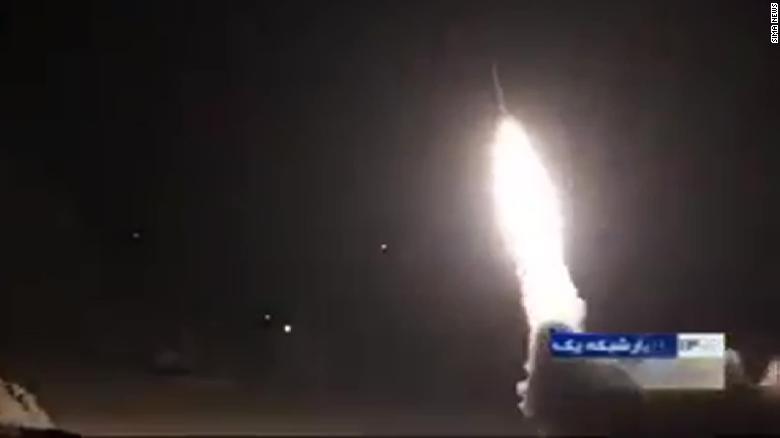ran has carried out a ballistic missile attack on air bases housing US forces in Iraq, in retaliation for the US killing of General Qasem Soleimani.
More than a dozen missiles launched from Iran struck two air bases in Irbil and Al Asad, west of Baghdad.
It is unclear if there have been any casualties.
The initial response from Washington has been muted. President Trump tweeted that all was well and said casualties and damage were being assessed.
Two Iraqi bases housing US and coalition troops were targeted - one at Al Asad and one in Irbil at about 2:00am local time (10.30pm GMT), just hours after the burial of Soleimani.
The Al Asad airbase - located in the Anbar province of western Iraq - was hit by at least six missiles.
Iran's Supreme Leader Ayatollah Khamenei said the attack was "a slap in the face" for the US.
"When it comes to confrontation, military action of this kind is not enough. What is important is that the corrupt presence of the United States should come to an end," he said.
Is this the end of the escalation?
This is the most direct assault by Iran on the US since the seizing of the US embassy in Tehran in 1979.
Iran's Revolutionary Guards said the attack was in retaliation for the death of Soleimani on Friday - killed in a missile strike outside Baghdad airport on the orders of President Trump.
"We are warning all American allies, who gave their bases to its terrorist army, that any territory that is the starting point of aggressive acts against Iran will be targeted," a statement said.
The chief of staff of Iran's regular military, Maj Gen Mohammad Baqeri, said the missile attack showed just a "small part" of the capabilities of the Iranian armed forces.
But Iranian Foreign Minister Mohammad Javad Zarif issued a statement on Twitter, claiming the attack was self-defence and denied seeking to escalate the situation into war.
The BBC's Middle East editor Jeremy Bowen in Baghdad says the tweets appear to suggest that Iran wishes to draw a line under its retaliation for the assassination of Soleimani and is putting the onus on the US as to whether the situation escalates.
'A modest response'
Jonathan Marcus, BBC defence and diplomatic correspondent
Given the significance of General Soleimani and the passions that his killing aroused - Iran's military strike against US bases in Iraq was a modest response.
The attack was clearly timed to cause as few casualties as possible. Both the US and Iran - for all their rhetoric - do not want a wider conflict. So maybe a line can be drawn under this matter for now.
Is this the end of Iran's retaliation? Time will tell.
But it is hard to see Iranian policy changing. It is presumably still going to try to secure its regional goals, not least the departure of US forces from Iraq.
The Soleimani killing has weakened the US position there. But it was rocket attacks from Iran's proxies - local Shia militia - against US bases that formed the prelude to this recent crisis.
Has the US established any measure of deterrence? And if not, will Iranian-inspired attacks resume in due course?
The US has around 5,000 troops in Iraq. President Trump said on Tuesday a US withdrawal of troops from Iraq would be the worst thing for the country.
His comments came in the wake of a letter, which the US military said had been sent in error, to Iraq's prime minister.
The UK foreign office told the BBC: "We are urgently working to establish the facts on the ground. Our first priority is the security of British personnel."
The UK has put the Royal Navy and military helicopters on standby amid rising tensions in the Middle East, Defence Secretary Ben Wallace said earlier.
Iranian President Hassan Rouhani will deliver a speech to the nation, Iranian state television said on Wednesday - but it did not give a timing.



